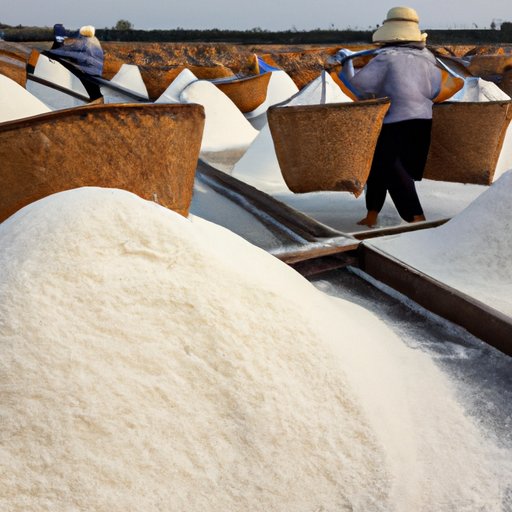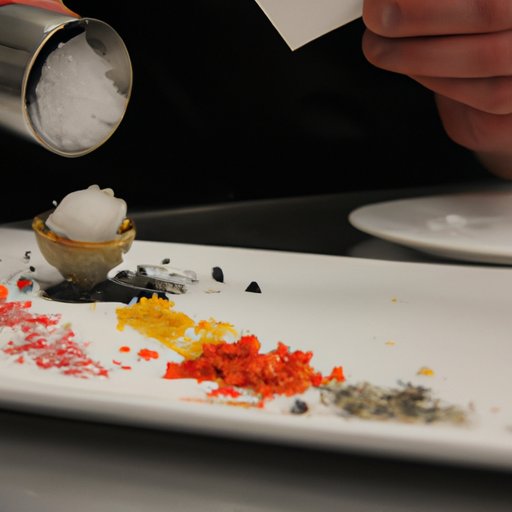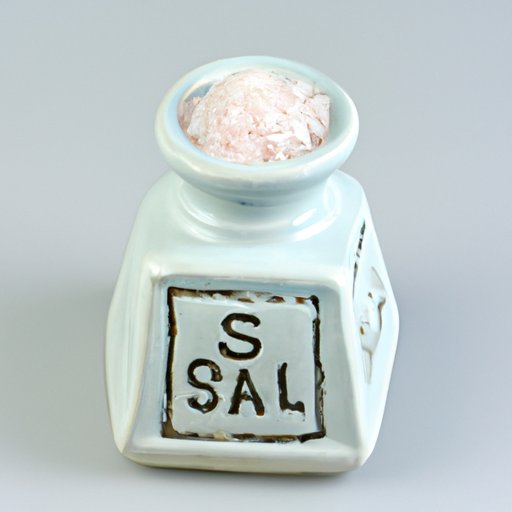Introduction
Salt has been an essential part of human life since the beginning of civilization. But when was salt invented? While it is impossible to pinpoint the exact date of its invention, it is possible to trace back its history and explore how it has been used throughout time.
Definition of Salt
Before delving into the history of salt, it is important to understand what salt is and why it is so important. Salt is a mineral composed primarily of sodium chloride (NaCl). It is found naturally in the environment, most commonly occurring as seawater or rock deposits. It is used in a variety of ways, including seasoning, preserving food, and even cleaning.
Overview of the Topic
In this article, we will explore the history of salt, from its invention in ancient times to its many uses today. We will examine how different cultures used salt for food preservation, flavoring, religious practices, health benefits, industrial uses, trade routes, and more. We will also look at the different methods of salt production and their impact on modern cuisine.
A Historical Timeline of Salt’s Invention
While it is impossible to know exactly when salt was first discovered, there are several ancient civilizations that have been credited with its invention. Let’s take a look at some of the key moments in the history of salt.
Ancient Egypt
Salt has been an integral part of Egyptian culture since ancient times. The ancient Egyptians used salt to preserve food, flavor dishes, and even mummify the dead. In fact, it is believed that the Egyptians were the first to develop the process of evaporating sea water to produce salt.
Ancient China
Salt has also been an important part of Chinese culture for centuries. It is believed that the Chinese began producing salt by boiling brine in the 7th century BC. They also developed methods of mining salt from underground salt deposits. These techniques would later be adopted by other civilizations around the world.
Ancient Rome
The ancient Romans were also known for their use of salt. They used salt to flavor food, preserve meat, and even to pay their soldiers. In fact, the Latin word for “salary” comes from the word “salarium,” which means “salt money.”
How Ancient Civilizations Used Salt
Now that we’ve looked at the history of salt, let’s explore how ancient civilizations used it. Here are just a few of the ways that salt was used in ancient times.
Food Preservation
One of the most common uses of salt in ancient times was for food preservation. Salt was used to cure meat, fish, and vegetables, extending their shelf life and allowing them to be stored for longer periods of time. This was especially important in areas where refrigeration was not available.
Flavoring
Salt was also commonly used to add flavor to food. In fact, the oldest known recipe is for a dish called garum, a salty fish sauce that was popular in ancient Greece and Rome. Salt was also used to enhance the flavor of other dishes, such as stews and soups.
Religious Practices
Salt also had spiritual significance in many cultures. In ancient Egypt, salt was used in religious ceremonies and offerings to the gods. In ancient China, it was believed that salt could ward off evil spirits and bring good luck. And in the Bible, salt is often used as a symbol of purification and divine covenant.
Exploring the Many Uses of Salt Throughout History
Salt has been used for centuries for a variety of purposes. Let’s take a look at some of the other ways that salt has been used throughout history.
Health Benefits
Salt has long been used as a medicinal remedy. It was believed to have healing properties and was used to treat everything from skin conditions to digestive problems. In fact, the ancient Greeks and Romans used salt as a disinfectant and antiseptic.
Industrial Uses
Salt was also used in a variety of industrial processes. It was used to make dyes, glass, and soap, and to tan leather. It was also used to create mortar, which was used in the construction of buildings and monuments.
Beauty and Hygiene
Salt has also been used for beauty and hygiene purposes. In ancient Egypt, salt was used to clean teeth and keep skin soft and supple. In medieval Europe, salt was used to whiten teeth and to remove body odor. It was even used as a deodorant and shampoo.

The Role of Salt in Ancient Trade and Economics
Salt has also played an important role in ancient trade and economics. Let’s take a look at two of the most significant ways that salt has impacted the economy throughout history.
Salt Taxation
Salt was so important to the economies of ancient civilizations that it was often taxed. In ancient China, the government imposed a salt tax, which was used to fund public works projects and military campaigns. In medieval Europe, salt was heavily taxed and was even used as currency in some areas.
Trade Routes
Salt was also a major factor in the development of trade routes. In ancient times, caravans of traders traveled hundreds of miles to transport salt from one region to another. This allowed for the exchange of goods and ideas between distant cultures and helped to spread knowledge and technology.

An Overview of the Different Methods of Salt Production
Throughout history, there have been many different methods of producing salt. Let’s take a look at two of the most common methods.
Evaporation
The evaporation method is one of the oldest and simplest methods of producing salt. This method involves boiling brine (salty water) until the water evaporates, leaving behind salt crystals. This technique is still used today in some parts of the world.
Mining
Mining is another common method of producing salt. This involves excavating salt deposits from the ground, then crushing and grinding the salt into a powder. This method was widely used in ancient times and is still used today in many parts of the world.

Examining the Impact of Salt on Modern Cuisine
Today, salt is used in a variety of ways in modern cuisine. Let’s take a look at two of the most important ways that salt is used in cooking.
Flavor Enhancers
Salt is widely used as a flavor enhancer in cooking. It is used to balance flavors, enhance sweetness, and add depth and complexity to dishes. Chefs also use salt to draw out the natural flavors of ingredients and to create unique flavor combinations.
Regional Dishes
Salt is also used to create regional dishes. For example, in Japan, salt is used to make miso soup, while in Italy, salt is used to make pasta sauces. In India, salt is used to make curries, and in Mexico, salt is used to make tamales. Each region has its own unique way of using salt in its cuisine.
Conclusion
In conclusion, salt has been an integral part of human life since the dawn of civilization. Its invention dates back to ancient times, when it was used for food preservation, flavoring, and religious practices. Throughout history, it has been used for a variety of purposes, from health benefits and industrial uses to beauty and hygiene. It has also played a major role in trade and economics, with salt taxes and trade routes helping to shape the global economy. Today, salt is still an important part of modern cuisine, with chefs using it to enhance flavors and create regional dishes.
Summary of Key Points
Salt has been an essential part of human life since the beginning of civilization. It has been used for centuries for food preservation, flavoring, religious practices, health benefits, industrial uses, trade routes, and more. There have been several different methods of producing salt throughout history, including evaporation and mining. Today, salt is still an important part of modern cuisine, with chefs using it to enhance flavors and create regional dishes.
Final Thoughts
Salt is an amazing substance that has played an integral role in human history. From its invention in ancient times to its many uses today, salt has had a profound impact on our lives. Its fascinating history and many uses are worth exploring and appreciating.
(Note: Is this article not meeting your expectations? Do you have knowledge or insights to share? Unlock new opportunities and expand your reach by joining our authors team. Click Registration to join us and share your expertise with our readers.)
